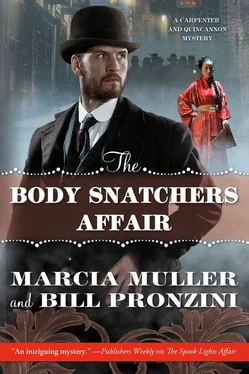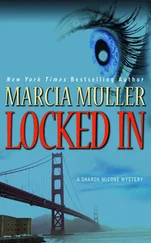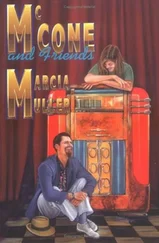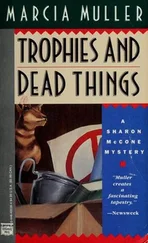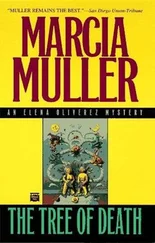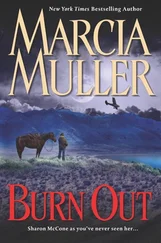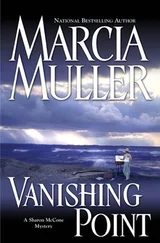“No, except that I was young and foolish and independent as the devil, and I hated having to ask my father for money. My salary in those days was not large and I... well, the mining camps were rough-and-ready places and I admit to a weakness for poker in those days.” Carson’s mouth quirked self-deprecatingly. “And to a fondness for sowing more than my share of wild oats.”
“Did you falsify your Gold King reports?”
“No. I came to my senses in time, thank God.”
“Kinney and Sneed must have been upset when you told them.”
“I didn’t tell them. I pretended to follow through, but in fact all I did was prepare two reports — a false one to satisfy them without actually aiding in the thefts, and a genuine, completely honest one for the Gold King’s owners.”
“Did you accept the five thousand dollars?”
Carson shook his head. “I told Kinney my conscience wouldn’t allow it. He said I was a fool, but he didn’t argue; he was only too happy to keep the five thousand for himself.”
A trio of hotel guests came hurrying along the promenade from the carriage entrance, chattering loudly among themselves. Sabina waited until they passed before she said, “If you came to your senses in time, why did you pretend to do Kinney’s bidding? Why didn’t you simply go to the owners or the authorities and reveal the plot to them?”
“I did, though not directly. I am the author of the anonymous letter that led to the gang’s exposure and arrest.” Carson’s tone was bitter again, this time with self-recrimination. “My conscience finally got the better of me after I moved on to Grass Valley, but I didn’t have the courage to go back and expose the scheme in person — I was afraid of being arrested myself and sent to prison, of blackening the Montgomery name. So I settled for writing the letter. God knows, I should have done it sooner.”
“If you had,” Sabina said, “someone in the gang might have realized you were responsible and implicated you.”
“I almost wish that had happened. As it was, I returned to San Francisco and accepted an offer to join Monarch Engineering. But I lived on tenterhooks during the trial and for a long time afterward. Eventually I came to believe my past mistake would remain buried, and so it was until that devil Sneed was released from prison.”
“He’d found out somehow that you wrote the anonymous letter?”
“Guessed it. A man has a lot of time to think when he’s cooped up in a cell for eight years, he said.”
“Did you deny it?”
“I tried to when he first turned up at my office, the day before you and I dined at Haquette’s, but he just laughed. I suppose he could tell from my reactions that he’d guessed correctly. He threatened to expose me, to make my part in the high grading seem much worse than it was, unless I paid him the same amount Kinney offered me — five thousand dollars.”
“Did you give him the money?”
“No. Not one red cent.”
Sabina raised an eyebrow.
“God’s honest truth,” Carson said. “I told him I refused to be blackmailed and in turn threatened him with a charge of attempted extortion.”
“You thought no one would believe the word of an ex-convict, eight years after the fact?”
“I hoped that might be the case. But that’s not why I refused to pay blackmail. I escaped punishment for what I did and almost did in Amador County, but my actions have weighed on my conscience ever since. There would be greater shame in accommodating a man like Sneed to keep my past sins secret than in having them revealed and my reputation sullied. It would almost be a relief to have the truth come out. My only regret if it does is what it would do to my father and the Montgomery family name.”
“Did Sneed make any further attempt to blackmail you?”
Carson nodded. “He slunk away that first time, but then two nights ago he showed up at my home with the same demand and an additional threat. If I didn’t pay, he would not only ruin me by going to the newspapers, he would see to it that I suffered a serious, possibly fatal ‘accident.’”
Two nights ago. The evening the bughouse Sherlock had summoned her to Huntington Park. He must have expected Sneed to come calling at the Montgomery mansion, perhaps even followed him there.
“And your answer then?” she asked.
“The same as before: no. I made him aware that I wasn’t afraid of him and cast him out.”
“Was that the truth? That you weren’t afraid of him?”
“Yes. I encountered more than a few men like Sneed in the mining camps. Full of bluff and bluster, but cowards at heart.”
This, and the rest of what Carson had said thus far, had the ring of truth. Sabina had watched him closely and he’d exhibited none of the telltale signs of the liar: no nervous gestures, or facial tics, or averted or too direct eye contact; no glib or overly earnest statements, no points glossed over or contradictory. But his innocence or guilt in the death of Artemas Sneed was yet to be determined.
Sabina was aware of water splashing in the fountain behind them, of the scents from the exotic blooms — her senses heightening as she pressed on with her questioning. “Did you see Sneed again after that night at your home?”
“No. I assume he gave up and crawled back into whatever hole he’s living in.”
“The Wanderer’s Rest on Davis Street.”
No reaction from Carson except mild surprise.
“You didn’t know he was lodging there?”
“No. It isn’t likely he’d want me to know.”
“That stick of yours,” Sabina said. “It wouldn’t happen to contain a removable steel shaft, would it?”
He blinked, taken aback by the apparent non sequitur. “You mean a sword cane? No, of course not.”
“Do you own such a stick?”
“No. I’ve never carried any weapon except a pistol, and that only during my time in the Mother Lode. What does a sword cane have to do with the matter at hand?”
“It’s the instrument that was used to kill Artemas Sneed.”
“To kill— Sneed is dead?”
“Run through in his room. Perhaps murdered, more likely killed in self-defense during a struggle. There was an unfired pistol in his hand.”
“My good Christ.” Carson’s astonishment, she was sure, was genuine. “How do you know all this, Sabina?”
“I have my sources.” She was not about to admit that she had discovered the body, or that she had failed to inform the police.
“And you think that I may have— No, I swear by all that’s holy, it wasn’t me. I’ve never been to Davis Street in my life.”
“Then you won’t mind telling me where you were between five and seven last evening.”
“Is that when Sneed was killed? I was at the Bank Exchange in the Montgomery Block, imbibing too many of Duncan Nichols’s Pisco Punches with three of my firm’s clients. If you’d like their names—”
Sabina shook her head. There was no need; Carson could not have a more credible alibi.
He said after a short silence, “Who did kill Sneed, I wonder?”
“It could be anyone. An ex-convict, would-be extortionist, and habitué of the Barbary Coast is sure to have made enemies, in and out of prison. The police may never find out.”
“Do they have my name?”
“No. Nor will they have it from me.”
“My part in the high-grading scheme... do you intend to tell the authorities about that?”
“You’ve given me no reason to. You had no direct role in the conspiracy, and you were responsible for the arrest and punishment of the perpetrators. Legally you couldn’t be prosecuted in any event. The statute of limitations on theft-related crimes is seven years. So you needn’t worry — as far as I’m concerned, your family’s good name and yours are secure.”
Читать дальше
